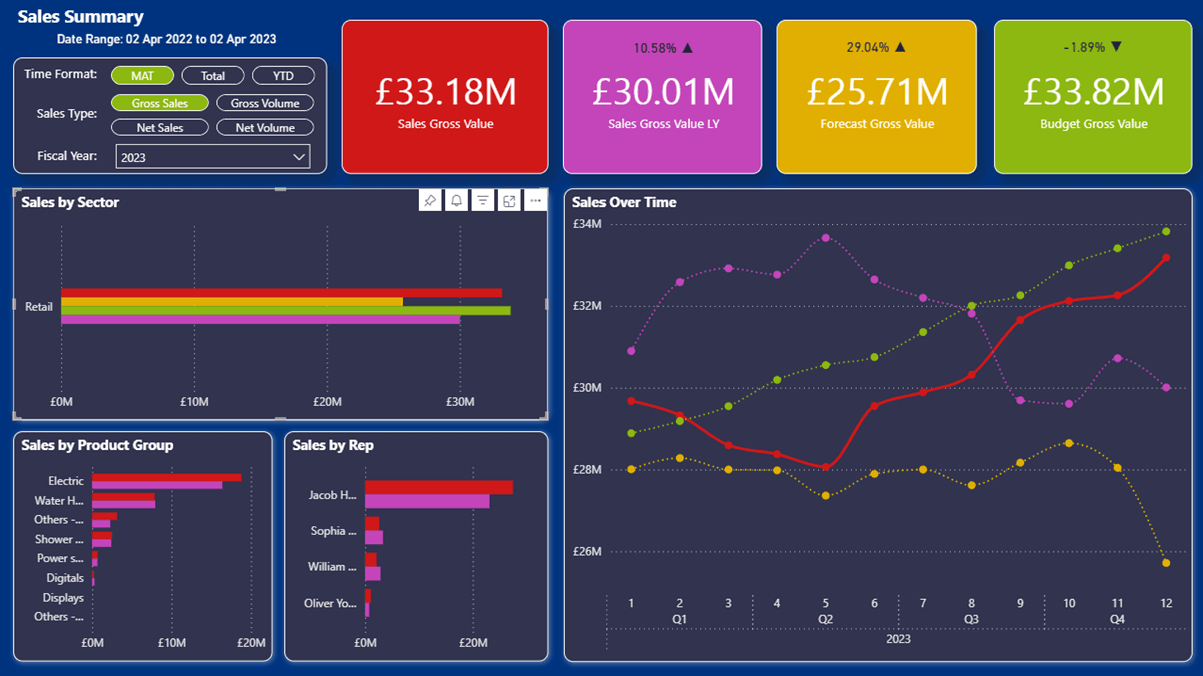Data Insights
What do finance leaders need to bear in mind when selecting business intelligence tools?
Key considerations when selecting BI tools In this fourth article it's time to look at several important factors and considerations to keep in mind when finance leaders are selecting business intelligence (BI) tools BI tools play a crucial role in helping


Key considerations when selecting BI tools
a bi-weekly series to help you get started on your data strategy journey.
So, you’ve overcome many of your initial concerns about BI tools after referring to our checklist in Blog 3 - What worries do finance leaders have about Business Intelligence Tools? If you missed it then you can find it and click on it above.
Now it is time to make your selection. When finance leaders are selecting business intelligence (BI) tools for their organization, there are several important factors and considerations to keep in mind. BI tools play a crucial role in helping organizations make data-driven decisions and manage financial performance effectively. So, here are some key considerations to bear in mind;
Alignment with Business Goals:
Ensure that the BI tools align with the organization's strategic and financial goals. The chosen tools should support the specific financial objectives and reporting requirements of the company.
Data Integration:
Consider the ease with which the BI tool can integrate with your existing data sources, such as accounting software, ERP systems, CRM systems, and other financial data repositories. Seamless data integration is critical for accurate and timely reporting.
Scalability:
Assess whether the BI tool can scale with your organization's growth. It should be able to handle increasing data volumes and user demands without significant performance degradation.
User-Friendly Interface:
The BI tool should have an intuitive and user-friendly interface that allows finance professionals to create reports, dashboards, and financial models without requiring extensive technical expertise. Training requirements for users should be minimal.
Data Visualization Capabilities:
Look for BI tools that offer robust data visualization options. Effective data visualization can make complex financial data more understandable and actionable.
Customization:
Consider whether the BI tool allows for customization of reports and dashboards to meet the specific needs of your finance team and executives. Customization should include the ability to add financial metrics and KPIs relevant to your organization.
Security and Compliance:
Data security is paramount, especially in finance. Ensure that the BI tool provides robust security features, including data encryption, role-based access control, and compliance with industry regulations like GDPR, HIPAA, or financial reporting standards like GAAP or IFRS.
Performance and Speed:
Assess the performance and speed of the BI tool. Slow reporting and analysis can lead to delays in decision-making. Look for tools that provide near real-time or quick access to financial data.
Mobile Accessibility:
In an increasingly mobile world, having access to financial data and reports on mobile devices is crucial. Ensure that the BI tool offers mobile-friendly features and apps.
Total Cost of Ownership (TCO):
Consider not only the upfront costs of the BI tool but also ongoing costs such as licensing, maintenance, and support. Evaluate the long-term TCO to determine the financial feasibility.
Vendor Reputation and Support:
Research the reputation of the BI tool's vendor. Read reviews, ask for references, and assess the level of customer support and updates provided by the vendor.
Data Governance:
Ensure that the BI tool supports data governance practices, including data quality checks, data lineage tracking, and data documentation. This is critical for maintaining data accuracy and reliability.
Future-Proofing:
Choose a BI tool that can adapt to evolving technology trends and data analytics methods. You don't want to be locked into a tool that becomes obsolete in a rapidly changing landscape.
User Training and Adoption:
Plan for user training and adoption strategies to ensure that your finance team can effectively utilize the BI tool to its full potential.
ROI Analysis:
Conduct a thorough ROI analysis to understand the expected benefits and returns on investment that the BI tool is likely to deliver.
By considering these factors, finance leaders can make informed decisions when selecting BI tools that best suit their organization's financial reporting and analysis needs. It's often advisable to involve IT and data experts in the evaluation process to ensure technical compatibility and data integrity.
Here at PTR we have many years of experience in helping business leaders select the best tools for them but we don’t leave it there – we want to help you throughout your data strategy journey and that means helping you with advice and training too. Our experts really know their stuff so feel free to ask us anything. We are the experts so you don’t have to be, no question is too trivial!
We hope you have enjoyed this blog series – the posts can all be accessed HERE
Blog 1 - how Finance Leaders are becoming empowered to get on board with Business Intelligence.
Blog 2 - Finance Leaders can use their own data for intelligent decision making.
Blog 3 - What worries do finance leaders have about Business Intelligence Tools?
Power BI's accessibility and user-friendly features make it a valuable tool for finance professionals looking to leverage data for better decision-making.
So long as you follow some basic guidelines on defining objectives and ensuring data integration you will be on the way towards enhanced business intelligence for your company. Finally you have user-friendly visualizations to help you collaborate with colleagues and make more informed business decisions. Don’t forget to keep your training up to date for you and your team. PTR can help! Please get in touch HERE
We offer Data Strategy Consulting, Data Analytics Consulting, Power BI consulting and Microsoft Fabric Consulting and that’s just for starters. Please contact us for your bespoke training course.
Please contact caroline.atkinson@ptr.co.uk to find out how we can help you improve your data insights. Our Business Intelligence Consultants are here to guide you on your data journey.
Share This Post
Mandy Doward
Managing Director
PTR’s owner and Managing Director is a Microsoft certified Business Intelligence (BI) Consultant, with over 35 years of experience working with data analytics and BI.
Frequently Asked Questions
Couldn’t find the answer you were looking for? Feel free to reach out to us! Our team of experts is here to help.
Contact Us


